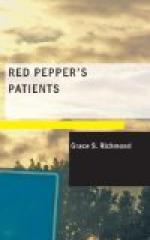“I don’t think much of luck. Get around it.”
“I’ll do my best, I promise you. But I wish you’d tell me—”
“Yes?”
“—why you should think I had done her any harm. Heaven knows I wouldn’t do that for my right arm!”
“She didn’t make a sign—not one—of any injury, I assure you. She’s a gallant little person, if ever there was one—and a thoroughbred, though she may be as poor as a church mouse. No, I should never have guessed it. She went away with all sails set and the flags flying. All I know is what my wife says.”
“Please tell me.”
“I’m not sure it will be good for you.” Burns smiled as he drew up beside a house. “However—if you will have it—she says Miss Anne Linton took away with her every one of your numerous letters, notes, and even calling cards which had been sent with flowers. She also took a halftone snapshot of you out at the Coldtown dam, cut from a newspaper, published the Sunday after your accident. The sun was in your eyes and you were scowling like a fiend; it was the worst picture of you conceivable.”
“Girls do those things, I suppose,” murmured King with a rising colour.
“Granted. And now and then one does it for a purpose which we won’t consider. But a girl of the type we feel sure Miss Linton to be carefully destroys all such things from men she doesn’t care for—particularly if she has started on a trip and is travelling light. Of course she may have fooled us all and be the cleverest little adventuress ever heard of. But I’d stake a good deal on Ellen’s judgment. Women don’t fool women much, you know, whatever they do with men.”
He disappeared into a small brown house, and King was left once more with his own thoughts. When Burns came out they drove on again with little attempt at conversation, for Burns’s calls were not far apart. King presently began to find himself growing weary, and sat very quietly in his seat during the Doctor’s absences, experiencing, as he had done many times of late, a sense of intense contempt for himself because of his own physical weakness. In all his sturdy life he had never known what it was to feel not up to doing whatever there might be to be done. Fatigue he had known, the healthy and not unpleasant fatigue which follows vigorous and prolonged labour, but never weakness or pain, either of body or of mind. Now he was suffering both.
“Had about enough?” Burns inquired as he returned to the car for the eighth time. “Shall I take you home?”
“I’m all right.”
Burns gave him a sharp glance. “To be sure you are. But we’ll go home nevertheless. The rest of my work is at the hospital anyhow.”




